Nigeria

Nigeria is the economic giant of West Africa. With about 184 million inhabitants it is the most populous country of Africa. With 923.768 km² Nigeria is three times bigger than Germany.
Location and Landscapes
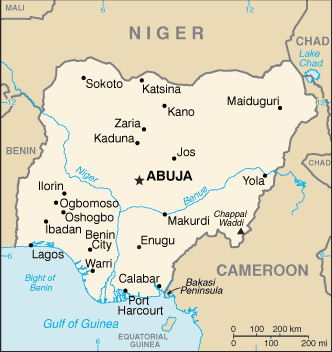
Nigeria lies in western Africa on the Gulf of Guinea. The area was formally known as the ‘Slave Coast’. In the west is Benin, in the north lies Niger, in the north-east Chad and in the south-west Cameroon.
The southern foothills of the Sahara extend into northern Nigeria. The area is made up of deserts with a dry desert climate. The north is sometimes affected by long periods of drought.
The gulf of Guinea is lined by lagoons and mangrove marshes. The climate here is mostly tropical but a rainy season lasts from April until October. Nigeria was once a country rich in forest. Today most of the forests have vanished due to producing farmland. Take a look on Nigeria’s flag. It shows the green areas that could by viewed by flying over the country some years ago. Today the flag would look different, there wouldn’t be so much green on it.
The Niger is the Lifeline of West Africa
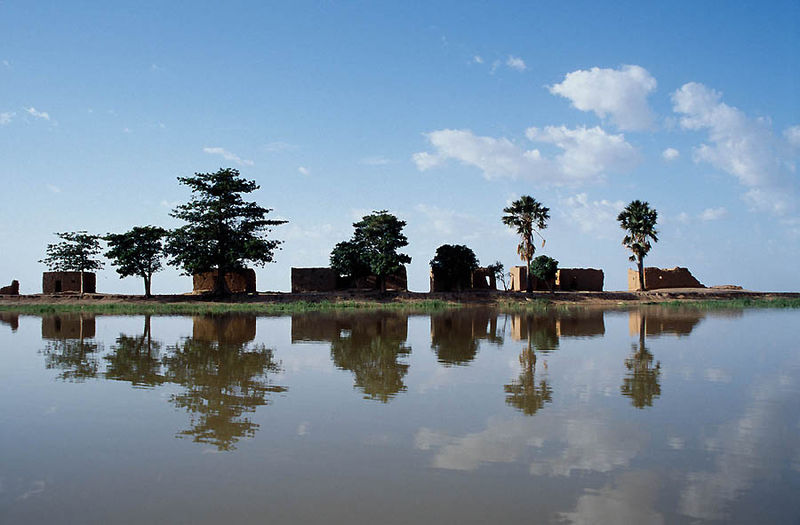
(c) Jialiang Gao
The Niger is the biggest river in West Africa. Its source is in the Guinea Highlands, and it runs through two countries before it reaches Nigeria. In the south-west it joins with the nearby river Benue and has a very strong current. After many kilometres, they empty into the Niger delta and flow into the Gulf of Guinea. This is one of the world’s largest river deltas, and the location of a large area of Central African mangroves. Many different peoples live along the Niger and live off the river. You can find crocodiles, snakes and many species of insects in the marshes and rain forests. Hippopotamuses, the most dangerous animals in Africa, live in the Niger.
Abuja – the New Capital
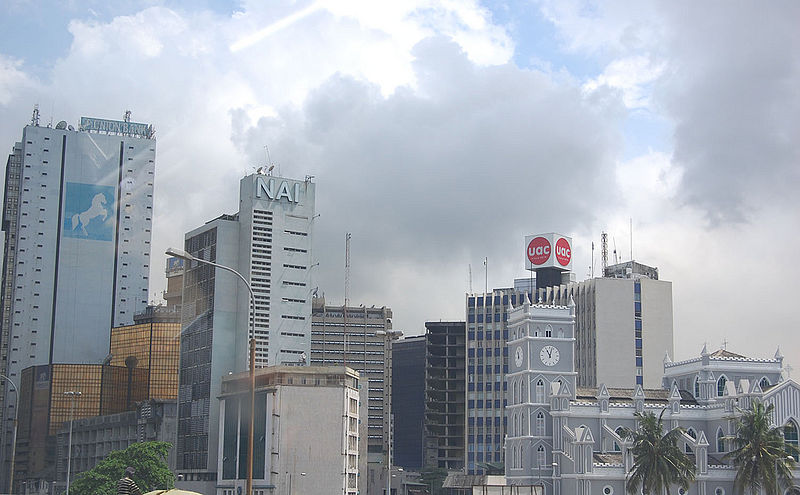
(c) Saalm
Abuja, situated right in the middle of the country, has become the new capital of Nigeria since 1991. The town was built in the seventies in the middle of Nigeria’s savannas. The area was inhabited by the Fulani tribe, a pastoral tribe. The story goes that in the evening hours, you can watch the shepherds as they herd cattle through the avenues of Abuja.
Lagos, the Former Capital of Nigeria
The biggest town of Nigeria and the cultural and economic center is Lagos, situated at the Atlantic. With more than 20 million inhabitants the Lagos Metropolitan Area is Africa’s biggest town. Lagos has many millionaires, but two thirds of the population are slum dwellers. It houses Africa’s busiest port and is the major financial center of Nigeria. It is estimated that Lagos generates about a quarter of Nigeria’s total gross domestic product. The energy and other initiatives implemented by the city government are enormous compared to the poor governance that characterizes most of the rest of Nigeria. Meanwhile, the city continues to grow explosively. The modern economy requires substantial new investment in education, which is why the university system of Lagos is rapidly expanding. Lagos is famous for its film industry and music scene. Nigerian hip hop, Highlife and Afrobeat were created in Lagos.
Nollywood – Filmproduction in Lagos
Nigeria is known as Nollywood, as according to the amount of films produced there, it is the third biggest film nation. Senegal has long been regarded as Africa’s most important film producing country. And if there is such a thing as the father of African cinema, then it is Ousmane Sembène. The Senegalese author first wrote novels, but due to poor circulation of books in his home town, he turned to film stories. His movie Black Girl, depicts the desperation of an African woman who works as a maid in France. The film earned him great international attention and European critics suddenly became interested in African cinema. Now Nigeria is currently the centre of the the African film industry. In Lagos, the biggest city in Africa, 2000 films a year are produced and the number is growing. Most films are thrillers and love stories turned into simple narratives. They are filmed with a simple digital camera and produced in a few days. They are then put on the market as DVDs. They are shown in the cinemas in the big cities, there are also many video rental businesses that travel around the country. They show the movies in ‘Walk-in Cinemas’ which are simple huts equipped with video and TV. They offer the locals an affordable enjoyment.The movies are about love and crime, poverty and prostitution, but always they depict the dream of something bigger and better. The films and soaps of Nigeria are produced cheaply and broadcast all over Africa, although very few make it to Europe or the USA.
The Peoples of Nigeria
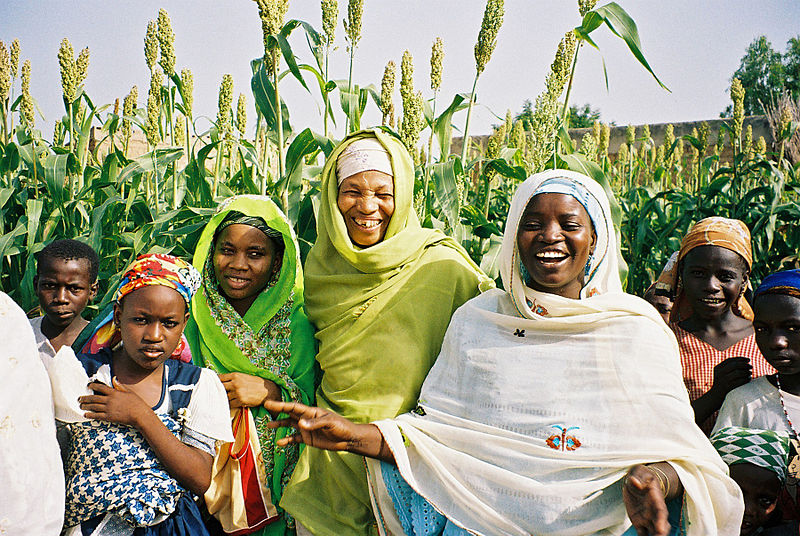
(c) USAID
Nigeria is the most densely populated country in Africa. There are 250 different tribes and at least as many religions, views and lifestyles. The most influential tribes are the Haussa in the north, the Yoruba in the west and the Ibo in the east. The Haussa in the north are known for their impressive clay buildings. The town Kano on the outskirts of the Sahelian Zone is famous for its old town built out of clay, complete with an emir palace and a large mosque. The early establishment of towns is characteristic of the culture of the Yoruba tribe. As early as the Middle Ages the biggest Yoruba towns had 100,000 inhabitants. The settlement area is still one of the most populous regions in Nigeria.
The Ibo peoples live in extensive democratic autonomous settlements. Concerns of the community are handled by a council of elders, to which both men and women belong.
The various traditions of such different tribes contribute to the uniqueness of Nigeria. They are also however, to blame for the many conflicts which arise here. Nigeria is a “young” country regarding the age of its population. Over 60 percent are younger than 24.
Languages and Religions
The official language of Nigeria is English, the language of the former colonial rulers Great Britain. In northern Nigeria, Arabic is also spoken on religious and cultural grounds. In Nigeria there is an almost unmanageable amount of religious communities. In the south, Christianity is dominant, whereas in the north the predominant belief is Muslim. The old African religions along with their rites and beliefs still exist in the land of the Ibo and the Yoruba.
Education and Schools
In Nigeria it is compulsory to attend school. From the age of 6 to 15, children are in education. Despite the fact that there is a good school system in Nigeria more than thirty percent of the population is not able to read simple textes. In the big cities Abuja, Ibadan or Lagos there are quite a lot of universities who attract students from other African countries. The schools and colleges are however in very poor condition. In some of the states in the north there are almost only Islamic schools, which only boys can attend. Part of the education of the Yoruba boys is to learn horse riding, swimming and hunting. The winner of a wrestling fight is honoured and gains social promotion. In older times wrestling matches.decided who was a chief and who was a warrior. Nigeria’s higher education sector has been very well developed some decades ago. But overburdened by strong population growth and a significant ‘youth bulge’ Nigeria has failed to deliver the resources to accommodate demand: A substantial number of would-be college and university students are turned away from the system. About two thirds of applicants who sat for the country’s national entrance exam in 2015 could not find a spot at a Nigerian university. Ongoing student protests and strikes have rocked Nigerian universities for years, and are a symptom of a severely underfunded higher education system.
Economy and Natural Resources
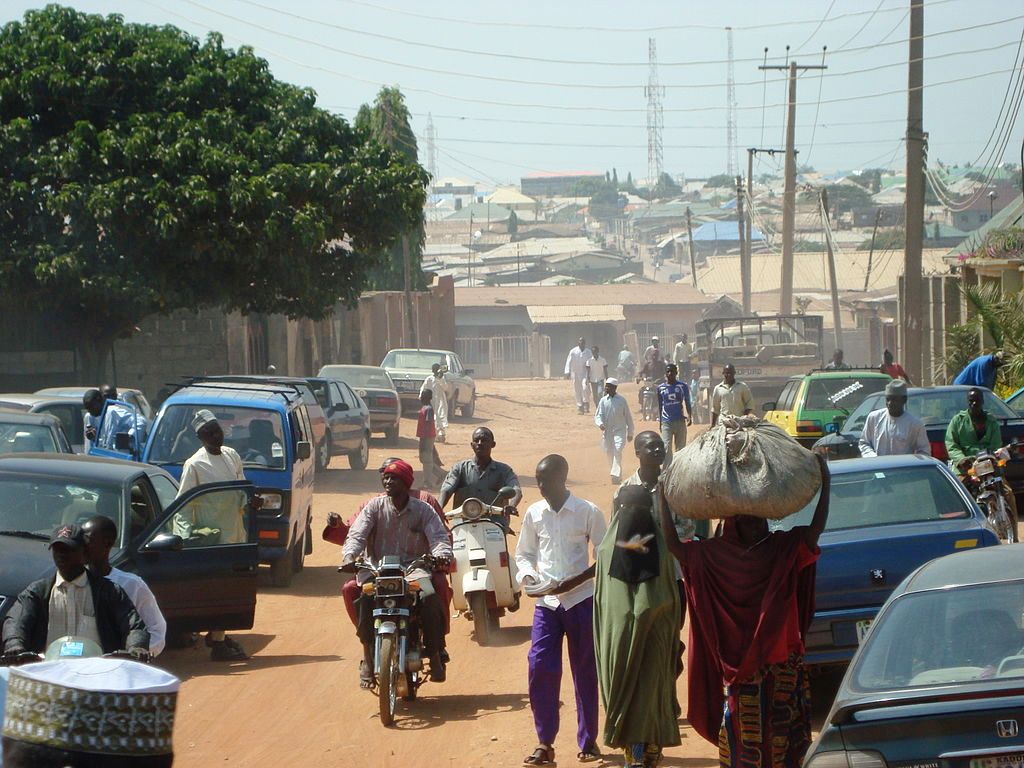 Nigeria is Africa’s leading oil producer with an output of over 2 million barrels of crude each day. Oil brings in around 95% of the country’s foreign earnings. Though it pumps a lot of oil, Nigeria does not have the facilities to refine it. Nigeria has one of the fastest growing telecommunications markets in the world, and has recently begun expanding this infrastructure to space based communications. And also, as economic giant of western Africa, Nigeria has a highly developed financial services sector, with a mix of local and international banks. Despite its growing economy, poverty levels in Nigeria are on the rise. This is because the oil wealth is not trickling down into society at large. Most people in Nigeria live of farming. Farming takes place on small plots of land. The main crops grown are yams, cassava, citrus fruits, peanuts and vegetables. Farmers use traditional manual methods of farming, with little money to invest in fertilisers or equipment. Therefore they cannot produce enough food for Nigeria’s huge population. Rice and other grains have to be imported.
Nigeria is Africa’s leading oil producer with an output of over 2 million barrels of crude each day. Oil brings in around 95% of the country’s foreign earnings. Though it pumps a lot of oil, Nigeria does not have the facilities to refine it. Nigeria has one of the fastest growing telecommunications markets in the world, and has recently begun expanding this infrastructure to space based communications. And also, as economic giant of western Africa, Nigeria has a highly developed financial services sector, with a mix of local and international banks. Despite its growing economy, poverty levels in Nigeria are on the rise. This is because the oil wealth is not trickling down into society at large. Most people in Nigeria live of farming. Farming takes place on small plots of land. The main crops grown are yams, cassava, citrus fruits, peanuts and vegetables. Farmers use traditional manual methods of farming, with little money to invest in fertilisers or equipment. Therefore they cannot produce enough food for Nigeria’s huge population. Rice and other grains have to be imported.
The History of Nigeria
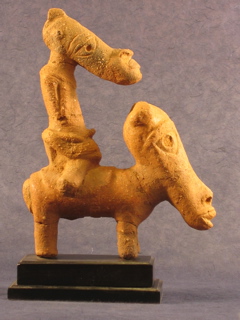
(c) Ericguillouard
The earliest human signs track back to the Iron Age (400 BC – AD 200). At excavations figurines of Terrakotta from the Nok culture of the Iron Age were discovered. Many of the stylised representations of animals and people can still be seen in the National Museum of Lagos.
In the Middle Ages, Kingdoms were established in the many different regions of Nigeria. From the 13th Century, the Yoruba kingdom of Ife was established in the south. Three centuries later it was superseded by the Kingdom of Oyo. Thanks to its well-equipped cavalry, Oyo gained authority between the Volta and the Niger. The reference to cavalry can still be seen on the crest of Nigeria. In the south-west the Kingdom of Benin was established. The Sokoto Caliphate ruled the south and the Emirate of Haussa ruled the north.
The powerful Yoruba kingdom was involved with trading slaves from the inland. As their power was weakened by conflict with other tribes, they themselves were victims of the slave trade. The slave trade was first abolished in the 19th Century.
English trading companies quickly built trading posts on the west coast. From the middle of the 19th Century Great Britain began to colonise the area of Nigeria. British rule lasted for one century. In 1960 Nigeria gained independence on the basis of a federal constitution.
Until Nigeria found a way to democratic constitution, many decades of civil war, military dictatorships and revolts have passed. In the seventies, Nigeria was the biggest crude oil exporter in Africa. The reckless oil production has in part ruined the landscape of the Nile delta and one of the biggest Mangrove forests on earth was lost.
Today Nigeria is on its way to a democratic constitution. A factor preventing this is that the oil wealth of the country benefits on a small elite community rather than the entire country. The British and Dutch company Shell Oil play an inglorious role. Many people today live in poverty. These social injustices as well as religious conflicts keep the country in turmoil.
Nigeria and its Festivals
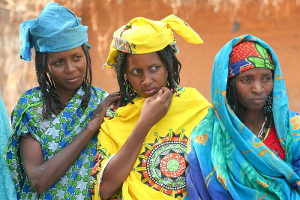
(c) Jialiang Gao
In the predominantly Muslim north, the end of Ramadan is celebrated with the Eid al-Fitr festival followed by the Sallah festival. The festivals consist of music, dancing and horse processions. In some areas there are spectacular demonstrations by the Borno horse-riders.
In the south many African religious festivals take place alongside the usual Christian holidays. At the end of the monsoon season in August and September, the Oshuna festival is celebrated in Oshogbo. Thousands of childless women make a pilgrimage to the town to plead for help from the Yoruba fertility goddess.
The western regions have masquerade festivals in June, the Oro festival in July and the Shango festival in August. In December the Igue festival takes place in the town of Benin.
Nigerian Literature
Nigeria is one of the most productive literary countries in Africa. Chinua Achebe’s 1950s novel Okonwo is the most read book in Africa. When Wole Soyinka in 1984 became the first author of black Africa, African literature could no longer be dismissed by the elites of the literary world.
Almost every child in Nigeria knows the story of Cyprian Ekwensi Burning Grass. The book is part of the school curriculum in Nigeria. It is about the Fulbe Tribe who are a nomadic people in the north of Nigeria and about the romantic love between a herdsman and the beautiful slave Fatimeh.
Wole Soyinka, a member of the Yoruba tribe, and Chinua Achebe from the Ibo tribe, were both born in the thirties of the 20th century. At the time Nigeria was still under the rule of the British colonies. Both were in favour of Nigerian independence and the end of colonisation. They criticised the military dictatorship and had to flee the country.
They were however opponents in the Biafran War that shook the country between 1967 and 1970. The war influenced both of their works. As a member of the Yoruba people, Wole Soyinka criticised the actions of the central government and was sentenced to 22 months imprisonment. Chinua Achebe, as a member of the Ibo tribe, argued for an independent republic of Biafra. Through their belonging to competing nations they had become personal rivals. Today both live in the USA and teach literature. Find more at Autobiographies
Another Nigerian author who wrote about his relationship to the Biafran War is Ken Saro Wiwa, who was involved as a young soldier in the hostilities of the war. Afterwards he wrote his harrowing anti-war Novel Sozaboy.
Chimamanda Ngozi Adichie is a young novelist from Nigeria. In her novels Blue Hibiscus and The other side of the Sun, she describes the situation for young women in Nigeria.
The novelist Chris Abani delivered a status report about the slums in Lagos and the dreams of the city youth of Africa today.



